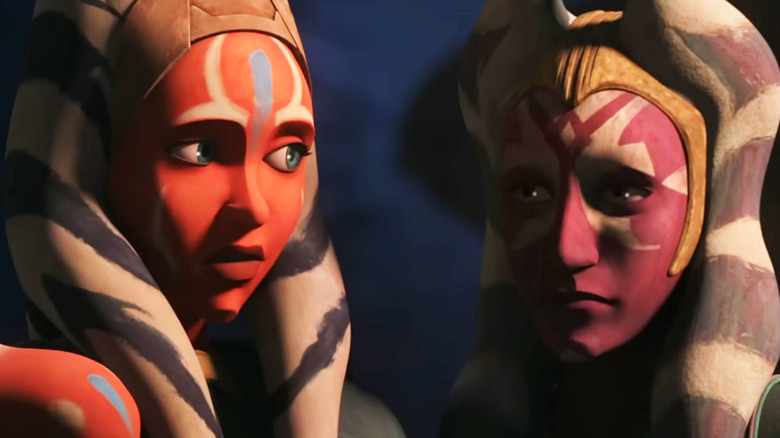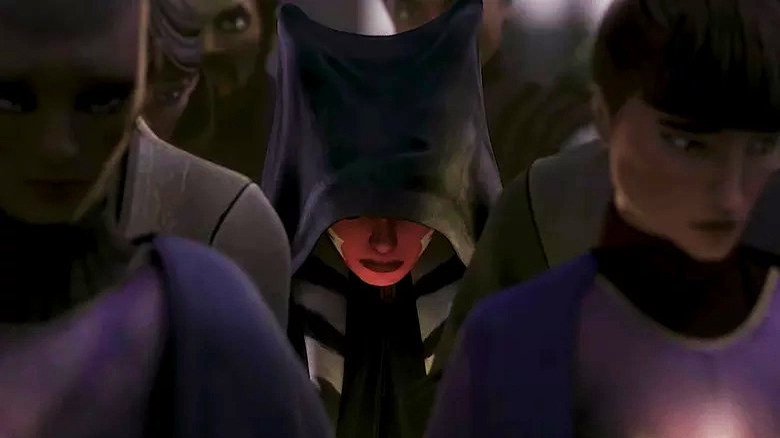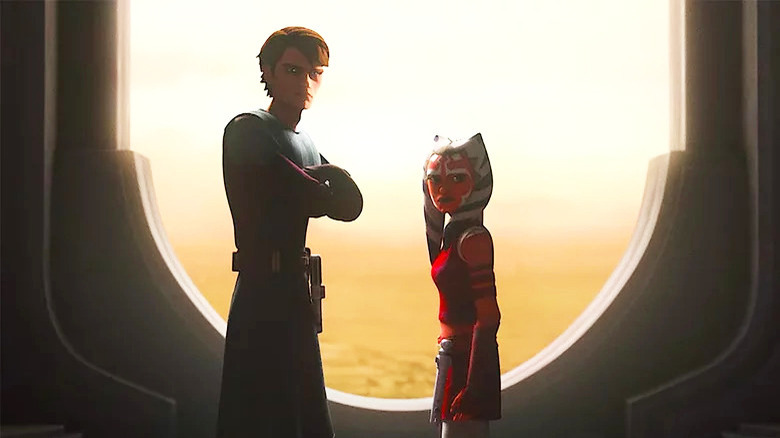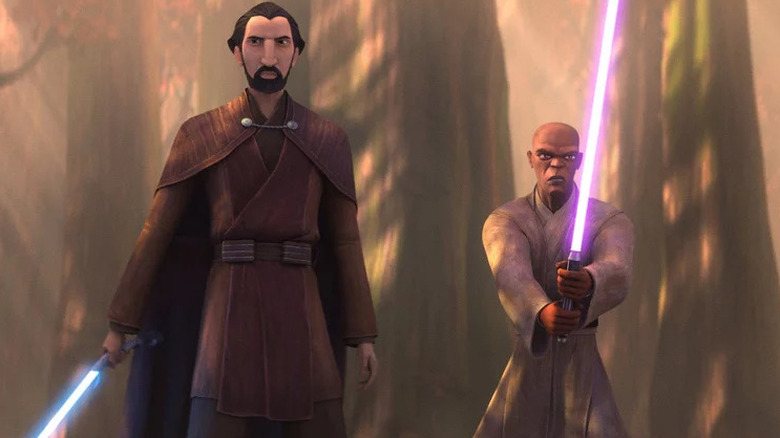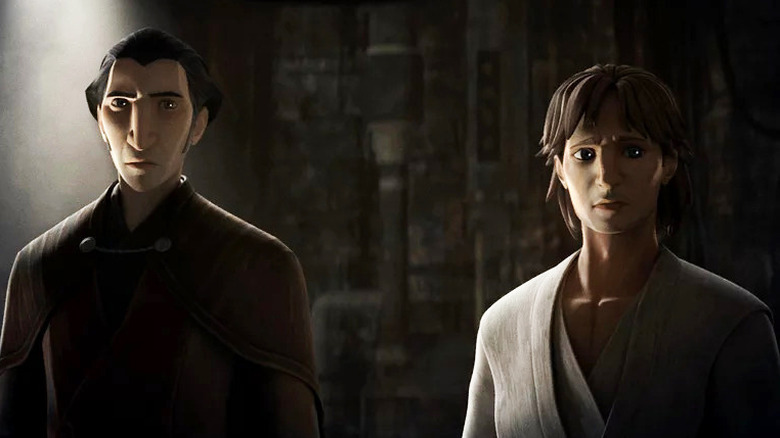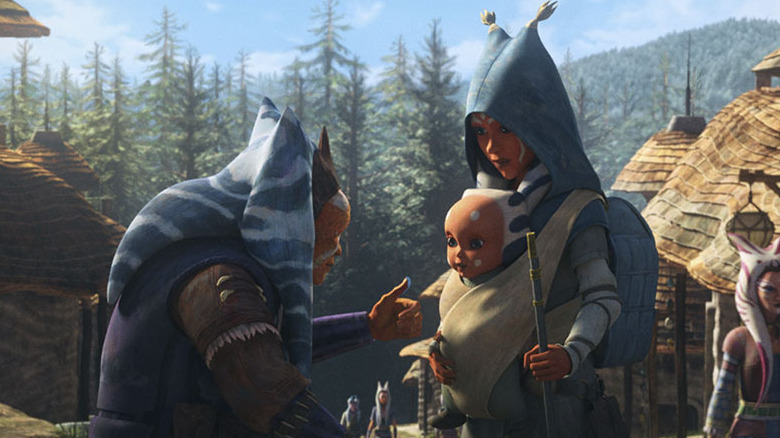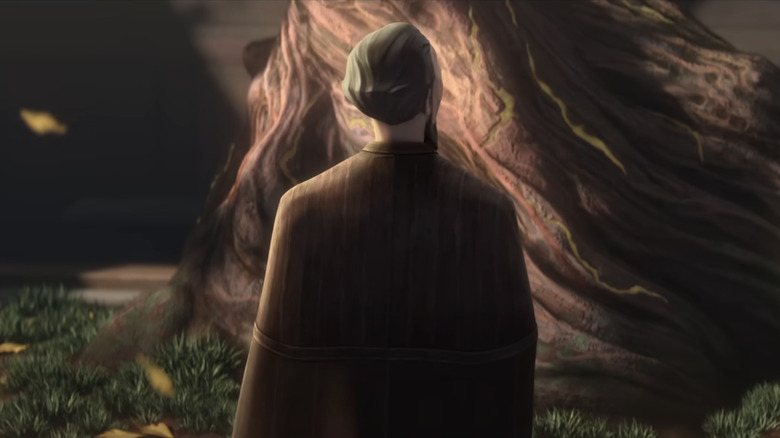The Saddest Moments In Star Wars: Tales Of The Jedi, Ranked
Full of pathos and lore, "Tales of the Jedi" returns us to the CGI style of "The Clone Wars" animated series and resituates us in the decline of the Republic era. Guiding fans through a cycle of births, deaths, and rebirths, Dave Filoni's six-episode anthology miniseries differ in spirit from the often-breakneck movement of "The Clone Wars," with each episode running shorter in average length but brimming with a distinctive emotional breadth and quieter introspection.
For many fans, these episodes fill the corners of curiosity for the history of established characters: the infanthood of Ahsoka Tano, Count Dooku's fall from the light, Qui-Gon Jinn's apprenticeship, and the devotion of the ever-elusive Yaddle to her friend Dooku. Though revealing their youthful days and their fates brings much heartache and sorrow — and Kevin Kiner's pensive scoring — these chapters are necessary to understand how these characters grew up (or regressed). Below, we take a look at the most tearjerking moment of each episode and how they rank against the others.
6. Ahsoka was at Padmé's funeral all along in Resolve (Episode 6)
One of the best Ahsoka stories occurs in "The Clone Wars" Season 3 in "Assassins," where Ahsoka confronts Force-visions of a bounty hunter murdering Padmé Amidala. In contrast to Anakin's descent into madness in "Revenge of the Sith," Ahsoka's adventure with Padmé was a lesson in balance: do everything she can to protect Padmé while allowing Padmé to make her own decisions (even if risky). Still, Ahsoka cannot always protect her friend. In a major canon reveal, we learn that Ahsoka Tano, who barely escaped her fate in "Death and Victory," managed to attend the funeral of Padmé Amidala incognito in a cloak. Ahsoka is attending at great risk since brain-chipped clone soldiers would be ready to execute her on the spot. Padmé's funeral ultimately cements Ahsoka's feelings of helplessness against the fall of the galaxy.
Back in Ahsoka and Padmé's glory days, they were two proud women who sought to do something in the galaxy. Although "Resolve" assures us that Ahsoka will return to that purpose, Padmé's death threw Ahsoka into a major depression pit long enough that she can only say, "I'm tired of fighting" and nearly reject a friend's aid. Out of all the moments chosen for this deep-dive, the tearjerking revelation relies the most on exact canonical knowledge of other "Star Wars" material to be emotionally effective, placing it at the bottom of the list.
5. Ahsoka and Rex face their fate, and friends, in Practice Makes Perfect (Episode 5)
Like the funeral above, this moment requires exact canonical knowledge of "The Clone Wars" to punch as it does. It also arguably rehashes the dynamics we've witnessed previously in "The Clone Wars." "Practice Makes Perfect" transports us back into the iconic master-apprentice rapport between Anakin Skywalker and Ahsoka Tano to underline the sorrow that will follow after. It also explains Ahsoka's survival of Order 66 with a tragically poetic touch. Wanting to test her skills, Ahsoka accepts Anakin's hardcore training as he assigns their clone soldier brethren to fire a barrage of stun rays. In its repetitious drudgery, the practice also serves as a bonding session for Ahsoka, Anakin, and the clone soldiers.
The lightheartedness of the training is suddenly undercut when the episode thrusts us into the far future: Ahsoka and Rex facing their fate, as seen in "The Clone Wars" finale. We've seen Ahsoka survive the clones' deadly blasters already in "Victory and Death," but "Practice Makes Perfect" gives another dimension to the showdown where Rex and Ahsoka stare down a room of hundreds of brain-chipped clone soldiers (led by their friend Jesse) ready to gun them down. They suspect that they will get knocked down by their own friends and never wake up again. We know their survival isn't a winning scenario for the pair because they will later bury these men, who happily trained and teased them. No longer are they part of a bonding session.
4. The Jedi funeral in Choices (Episode 3)
In "Choices," Dooku and Mace Windu investigate the killing of the Jedi Master Katri. This culminates in a rage-filled breakdown where Dooku's actions lead to the senator's death and the exposing of bodyguards who murdered him. It's a messy situation, but messier because Dooku recognizes the point of view of the murderers despite disagreeing with their tactics. Like in "Justice," Dooku realizes that the status quo (the Jedi's deference to the Republic's ideals of peace) hasn't been helping the people. Despite the fact that the audience doesn't really get to know Master Katri (which weakens the solemn tone somewhat), the somber mood of the funeral symbolizes Dooku's soul being buried and his festering skepticism.
Charles Murray and Élan Murray's script also drops this quote, deceptively casual yet double-edged, in the eulogy: "Master Katri was patient with Younglings and Jedi who questioned themselves relentlessly." The irony of this quote describes the turmoil within Dooku, whose questions only pain his heart and drive him further from the Order. It also underscores how the Jedi Order as a whole barely asked meaningful questions about who and what they are protecting and why they lost the trust of the people. The funeral coldly surrounds Dooku with his Jedi community to denote his isolation. In his next chapter, he does not even join his Jedi brethren for Qui-Gon Naboo's funeral, highlighting his increasing alienation.
3. Dooku wonders about meaningful change in Justice (Episode 2)
Set in a poor planetary village neglected by its corrupt senator, "Justice" explores a scenario where the master (Dooku) acts on rash impulses while the apprentice (Qui-Gon Jinn) saves the day. Luckily, Qui-Gon's quick thinking prevents the worst-case scenario of Dooku's rage-filled attack, ceasing the gunfire once and for all. And yet, nothing feels resolved for the poor village. The senator's son can only assure them that he will bring justice for their strife. However, the episode does not encourage the audience — nor Dooku or Qui-Gon — to trust a well-intentioned promise. For now, we watch the downtrodden poor stay poor.
"Justice" hints that the resolution may not last or even come to be. "Justice" does conclude with hope for the village as Dooku forlornly observes them rebuilding their home and tending to the injured after the violence. Still, Dooku tells Qui-Gon, "I wonder if any meaningful change will come of this?" "Justice" asks its audience to distinguish between short-term and long-term resolutions, noting that the latter is even harder to achieve. A difficult one to rank, this moment lands somewhere in the middle because of its resonant introspection through Dooku's storyline in "Tales of the Jedi." Nevertheless, it does not compete with the Dooku's deeper personal sorrow of "The Sith Lord."
2. Ahsoka's off-screen departure in Life and Death (Episode 1)
All the Ahsoka moments on this list work mostly when you've seen the canon material, but this moment thrives on what remains unseen. When Dave Filoni screened "Life and Death" at the 2022 Star Wars Celebration, audience cheers rose when the Togruta chieftain announced that "Ahsoka is Jedi." However, the expressions on Ahsoka's mother and father are not rejoicing. If Ahsoka is a potential Jedi recruit, they may never see their daughter again. You can have a broad stroke of knowledge (Ahsoka's Jedi status) to know why this hurts.
"Life and Death" sifts through the life of Ahsoka's Togruta tribe, their traditions, their reverence for nature, and their communal love for one another. Ahsoka left so much behind when she joined a new Jedi family. Without showing Ahsoka's departure to the Jedi Order, we are left with the discomforting questions when we watch Ahsoka's Jedi career through "Tales of the Jedi." How did her parents and community watch Ahsoka leave for the Jedi Order? How did her family react when the Jedi Order was exterminated? How long did her parents and village survive under the Empire to wonder about the little girl who left them? The accumulation of those questions adds to gut punches that offset most of the other sad moments on this list.
1. Dooku mourns by the tree in The Sith Lord (Episode 4)
The turning point where Dooku abandons the Order for good, "The Sith Lord" is rife with heartbreakers. In one moment, Yaddle literally lets Dooku see the light. For a fleeting moment, Dooku's eyes flash with hope and wonder, amazed at the lengths his friend would go to save him. But then he solemnly extinguishes the warmth of the light, killing his friend and swearing fealty to Darth Sidious. The most heartbreaking moment in "The Sith Lord" isn't Yaddle's light, though. It's Dooku's solitude by the Temple's uneti tree when he learns of the murder of Qui-Gon Jinn, yet rejects the invite to the Naboo funeral. "The Sith Lord" contains a sobering internal theme about old teachers watching their loved ones — particularly their apprentices — meet divergent fates.
He commiserates on Qui-Gon's affection for the tree, one of the rare spots of plant life in the industrialized "steel and stone" Coruscant. It adds depth to the context that Qui-Gon and Dooku grew up around, with both men growing up on a planet of bright lights that belies its (implied) uprooting of life (plant life) to build a metallic planetary surface of prosperity — for only the privileged few. For a long-time Lucasfilm Animation watcher, Dooku's mourning also echoes an illusion in the pseudo-finale of "The Clone Wars" where Yoda imagines Dooku and Qui-Gon peacefully assembled at the tree. This is the saddest moment for all its dimensions, self-contained and grand for the world of "Star Wars."
